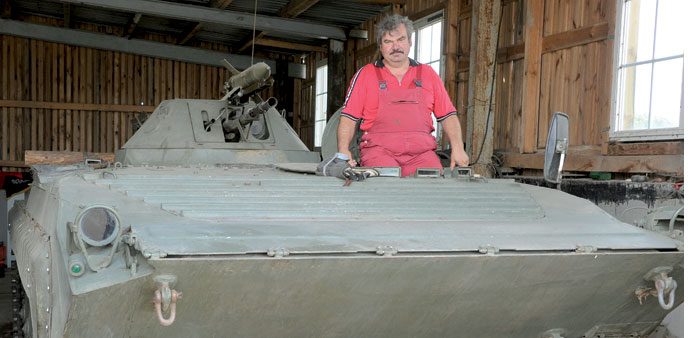Tank collector Paul Benzin in the driver’s hatch of a BMP OT-90 tank formerly used by the Czech Armed Forces. He owns four tanks and keeps them in a shed near Templin, Germany.
By Ana Mia Neumann
Millions of people in Germany collect something or other, be it postage stamps, beer-mats or the cute plastic figures that pop out of Kinder Surprise chocolate eggs. These all fit easily into a living-room display cabinet.
But not the heavyweight items treasured by Paul Benzin. He collects army tanks which can weigh up to 43 tonnes apiece. They squat in a garage on his land in the Brandenburg village of Storkow near Templin. “Every time I come home I go into the garage and stroke one of them,” said the 53-year-old in his dark red dungarees.
Benzin, a sun-tanned scrap dealer, has four tanks to call his own — three Russian ones and an American vehicle. A number of four-wheel-drive, jeep-like vehicles dating from the 1940s to the ’80s also form part of the collection, most of them obtained in swaps with like-minded enthusiasts.
“A lot of energy goes into all this,” said Benzin.
Back in the days when former East Germany was a state in its own right, Benzin served with the communist country’s National People’s Army (NVA).
“For 18 months I did virtually nothing else but repair tanks,” he said. When the Wall that divided the two Germanies finally came down, Benzin came across his first tank in a local forest. It had been abandoned by the Soviets and was in a poor state of repair. “That was when things took off.”
Benzin simply adopted the elderly fighting machine — a T34 tank — and no one stopped him from winching it onto a low-loader with a pal and taking it first of all, to a scrap-metal yard. These days the fearsome Soviet medium-sized tank with its metal tracks and dummy rocket launchers is parked in his garage. On the door hangs a sign “Restricted military area” and next to it are bales of hay.
Around the corner is a row of stables. Benzin earns his money by running a pony riding school in Storkow and a scrapyard in Templin.
Collecting or gathering is one of man’s basic instincts, according to an expert who should know, Wolfgang Peschel who works for the German Philatelist’s Federation.
“Collecting ensures our survival and it continues to fascinate many people today,” said Peschel. “It is like a virus that takes hold of your head.” Collectors always want to know more, to expand their collection and yet are still reliant on chance.
“They are a bit like athletes notching up records”.
Benzin spends a lot of his spare time tinkering with his tanks. He repairs them, bends dented panels back into shape and gives them a coat of fresh paint. In the corner of his sizeable property he has heaped up sand to make a miniature proving ground.
“This is my tank course,” he said proudly. The local authority allows him to use the land to put his tanks through their paces.
Tanks are not allowed to trundle along public roads in Germany unless there is a national emergency or for military reasons. Exceptions require specific permission from transport authorities.
Benzin enjoys firing up one of his treasures for a weekend spin around his home-grown range, walloping through huge puddles and storming hills in a cloud of dust.
“On Father’s Day we were out with some friends and acquaintances and then again to mark a pal’s 60th birthday.”
In Germany collecting tanks is not as unusual as might be thought. “Around a 1,000 of them are in private hands,” said Benzin. Fans meet up regularly to help each other or exchange tips.
Most deals are conducted as swaps or trade-ins — tanks are seldom sold on the open market.
Benzin is currently embroiled in negotiations with an Austrian to exchange his US tank for an elderly ex-Soviet machine. “My idea is to have a collection solely from the east,” said Benzin, his cheeks glowing as he warms to the subject. “You know tanks are just the thing for me — they give me a feeling of freedom.” — DPA

